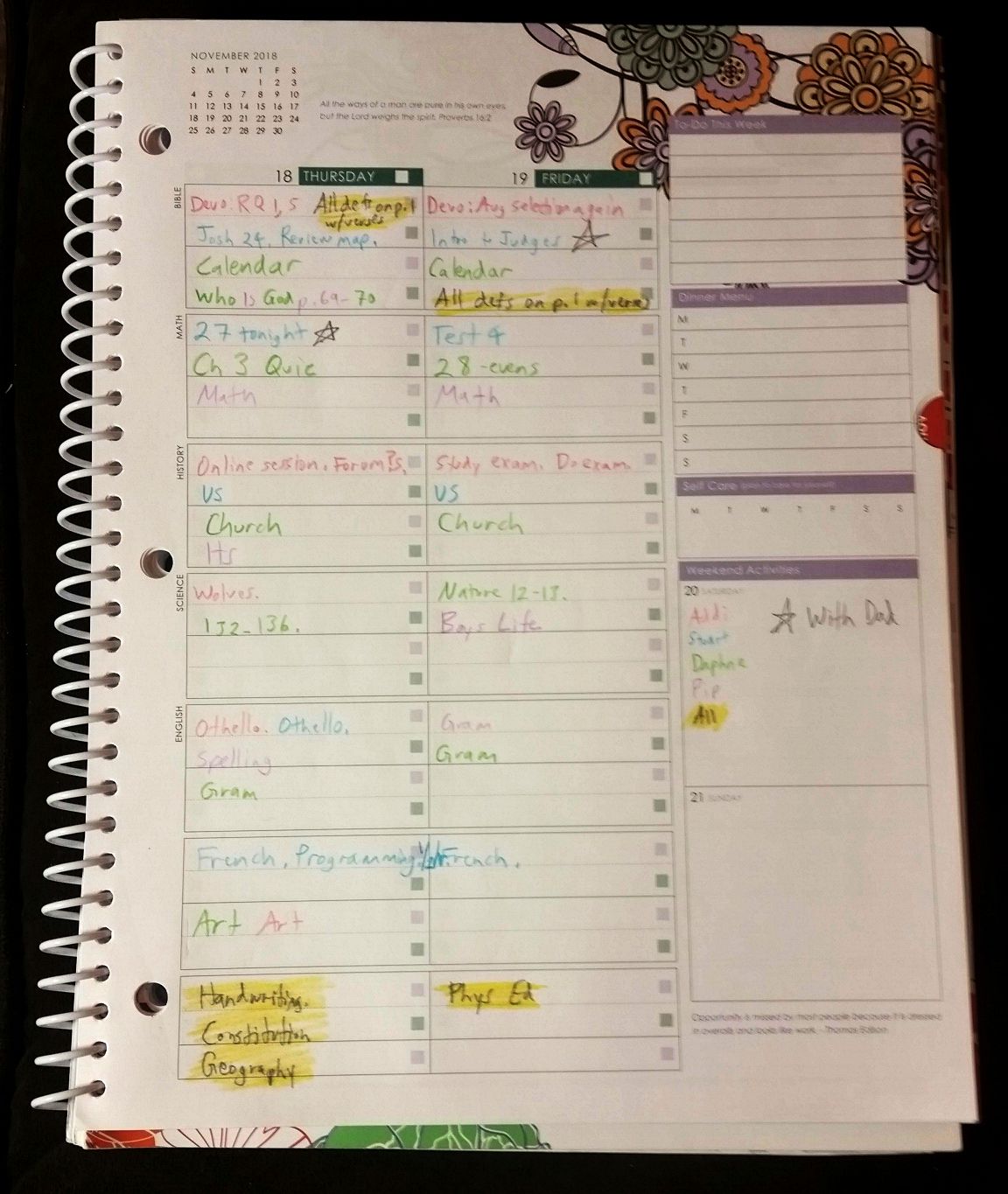Lesson plans look so good on paper. You have a clear view of what everyone is doing and what they’re going to accomplish. The problems begin when our well-laid plans encounter actual children.

Darren’s neat and tidy lesson plans are color-coded according to child.
As homeschooling parents, Darren and I know we’ll have to adjust our expectations to meet reality. The tricky part is that there’s no one way to adjust. Sometimes we laugh, sometimes we restructure the whole assignment, and sometimes we just have to weather the tears.
For instance, one child of ours enjoys meeting requirements from an unexpected direction:
Lesson Plan:
Assignment: Highlight major events of the American Revolution as newspaper headlines.
Skill: Choosing the most important information and summarizing it.
Real Lesson Plan:
Assignment: Turn the American Revolution into click-bait articles.
Skill: Make everybody laugh while showing off that you know what you’re talking about.
- Breaking News: British Soldiers Fire Upon Innocent Colonists in Boston!
- Martial Law in Boston, and What This Could Mean for You!
- Group of Colonists Have Amazing Idea for Rebelling against British Taxes!!
- A Look Inside the Terrible Conditions of Valley Forge! (Shocking!)
- The British Defeated in Yorktown! You Won’t Believe How!!!!!!
Obviously, we’ll have a future lesson in what actual newspaper headlines sound like. But we counted this one a success.
Other times, what we think we’re teaching isn’t really what a child needs to learn:
Lesson Plan
Assignment: For your study on Shakespeare, compose a sonnet.
Skills: Knowledge of the sonnet form and rudiments of poetry.
Real Lesson Plan:
Assignment: Written in pen underneath the assignment: “No, no, no—I have an AP history exam this week, so I can’t do poetry too.”
Skill: Student realizes when she’s feeling overwhelmed and comes to us for help.
We deal with a whole range of time-management problems. Sometimes it’s a case of procrastination or out-of-order priorities (how long did you spend watching YouTube?), but sometimes we’ve handed our inexperienced student too big a task. Either way, our kids need help learning how to handle their responsibilities. That note scrawled in the planner showed a step of maturity—this particular child is prone to stay silent and drown under a heavy load instead of asking for help in managing it. We rescheduled the poetry assignment to give her room to focus on her history exam. The lesson was a success.
We don’t always take away an assignment that looks too hard. But sometimes it doesn’t turn out to be the independent work session that we envisioned:
Lesson Plan:
Assignment: Read about Harriet Tubman and write a five-sentence paragraph.
Skills: Research, writing, composition.
Real Lesson Plan (just strap yourself in):
- Show your child the assignment: Read about Harriet Tubman and write a five-sentence paragraph.
- Allow your child to grieve the fact that she has to do the assignment.
- Encourage your child to think positively:
- Remind her that she can type the paragraph on the computer.
- Mention that it’s only five sentences.
- She is fully capable of writing sentences.
- Five sentences are not going to kill her.
- Brainstorm with your child:
- Who is her paragraph about?
- When did she live?
- Where did she live?
- What did she accomplish?
- Why is she important?
- Allow child to grieve the fact that she has to answer these questions.
- Again walk through the information with the child. Who is her paragraph about? Why is this person important? Joke with her that “I don’t know” sure is a funny name for someone! Your child will not think this joke is funny.
- While your child suffers through the composition of a sentence such as Harriet Tubman was born in Maryland and lived from 1820 to 1913, remind her that you are available if she needs help. You don’t have to sit right next to her as she works. You will be able to hear her agony no matter where you are in the house.
- Repeat steps 4-7 for an indeterminate period of time.
- Your child will eventually write sentences, which then form a paragraph about Harriet Tubman. She may even include an insightful conclusion about how inspiring Tubman’s story is.
- Get chocolate for both of you.
It was harrowing, but at the end of the ordeal, our child had new confidence in her abilities. A success! A darn hard-earned one, in fact.
And finally, even objections and tears can’t spare a child from some basic schoolwork:
Lesson Plan:
Assignment: Write these words using the handwriting strokes you’ve been taught.
Skill: Ease and legibility of writing.
Real Lesson Plan:
Assignment: Drip tears onto your page because Mom is “so bossy” about the right way to write the letters.
Skill: Learn to write anyway.
Years of tear-stained handwriting papers suggest that I have a history of bossiness about the right way to write letters.
Homeschooling isn’t an undertaking where you can find the right method and coast; it’s a lot of adjustment, understanding, and give-and-take between parents and children. Even though we know where we’re going, it often takes a few detours to get there.
So here’s to all us bossy parents who weather the tears, the angst, and the occasional breakthroughs of brilliance. Have some chocolate.
—Sara

